Applying Psychological Principles to Analyze 'Gift of Roses' Article
VerifiedAdded on 2023/06/18
|6
|1515
|484
Essay
AI Summary
This essay provides a comprehensive psychological analysis of the article 'Gift of Roses,' focusing on the application of six key principles of scientific thinking to understand the underlying themes of happiness, altruism, and adolescent well-being. The analysis explores the concepts of rival hypotheses, correlation versus causation, falsifiability, replicability, extraordinary claims, and Occam's razor, relating them to the article's discussion of subjective well-being and the impact of altruism on adolescent behavior. The essay concludes by emphasizing the importance of addressing negative emotions and fostering psychological well-being in adolescents, highlighting the role of training programs and interventions in promoting healthy development. Desklib offers this essay as a study resource, alongside a vast library of solved assignments and past papers for students.
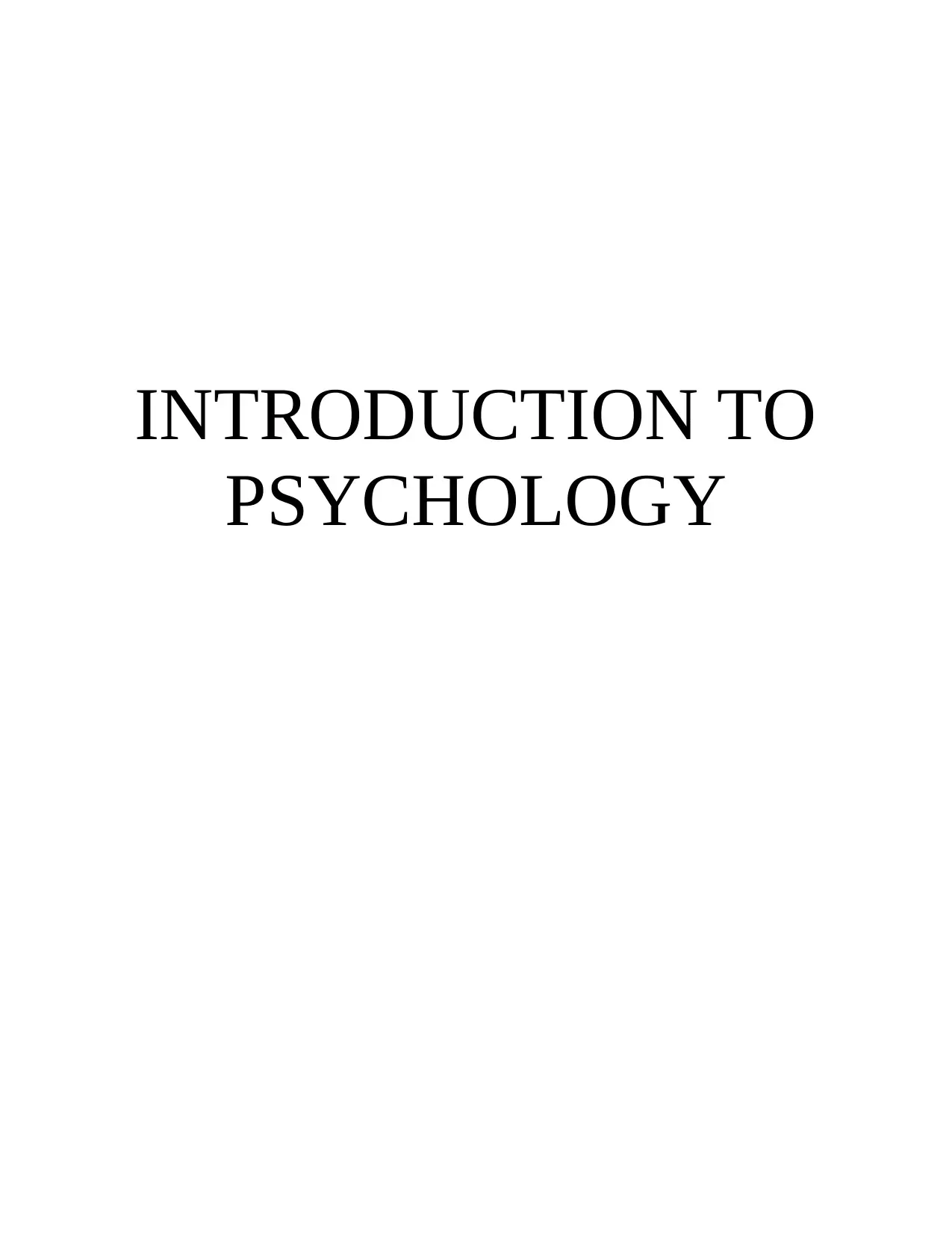
INTRODUCTION TO
PSYCHOLOGY
PSYCHOLOGY
Paraphrase This Document
Need a fresh take? Get an instant paraphrase of this document with our AI Paraphraser
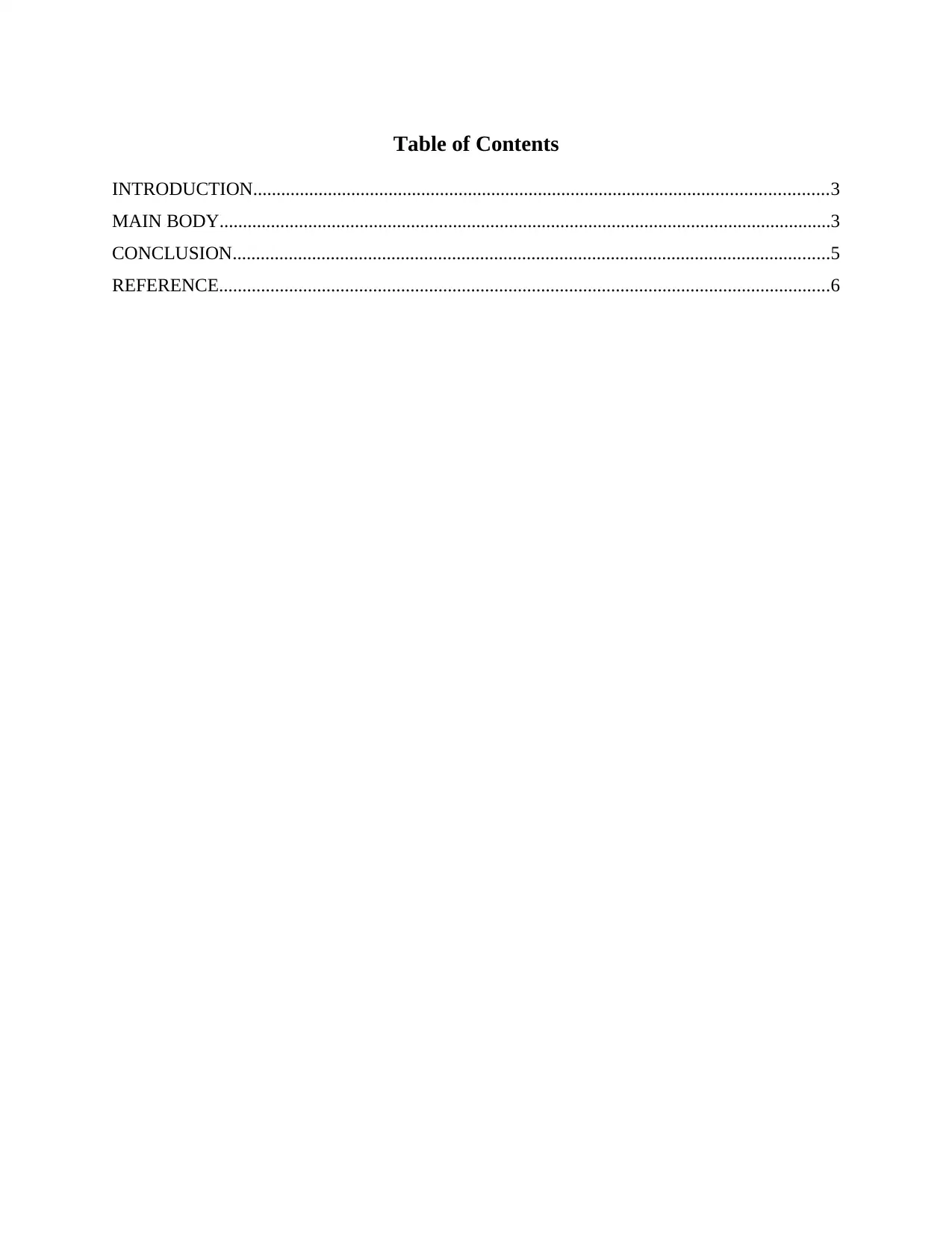
Table of Contents
INTRODUCTION...........................................................................................................................3
MAIN BODY...................................................................................................................................3
CONCLUSION................................................................................................................................5
REFERENCE...................................................................................................................................6
INTRODUCTION...........................................................................................................................3
MAIN BODY...................................................................................................................................3
CONCLUSION................................................................................................................................5
REFERENCE...................................................................................................................................6
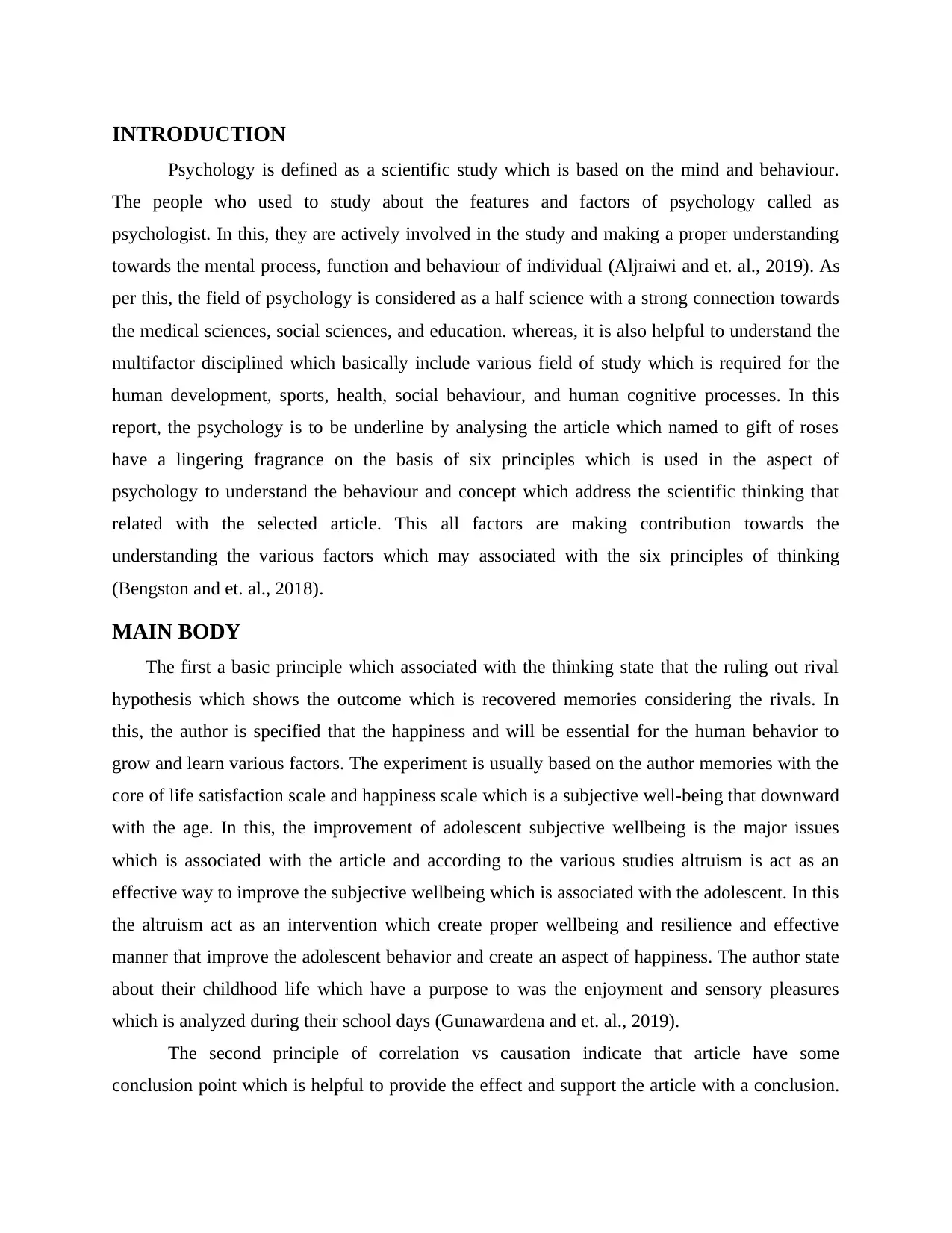
INTRODUCTION
Psychology is defined as a scientific study which is based on the mind and behaviour.
The people who used to study about the features and factors of psychology called as
psychologist. In this, they are actively involved in the study and making a proper understanding
towards the mental process, function and behaviour of individual (Aljraiwi and et. al., 2019). As
per this, the field of psychology is considered as a half science with a strong connection towards
the medical sciences, social sciences, and education. whereas, it is also helpful to understand the
multifactor disciplined which basically include various field of study which is required for the
human development, sports, health, social behaviour, and human cognitive processes. In this
report, the psychology is to be underline by analysing the article which named to gift of roses
have a lingering fragrance on the basis of six principles which is used in the aspect of
psychology to understand the behaviour and concept which address the scientific thinking that
related with the selected article. This all factors are making contribution towards the
understanding the various factors which may associated with the six principles of thinking
(Bengston and et. al., 2018).
MAIN BODY
The first a basic principle which associated with the thinking state that the ruling out rival
hypothesis which shows the outcome which is recovered memories considering the rivals. In
this, the author is specified that the happiness and will be essential for the human behavior to
grow and learn various factors. The experiment is usually based on the author memories with the
core of life satisfaction scale and happiness scale which is a subjective well-being that downward
with the age. In this, the improvement of adolescent subjective wellbeing is the major issues
which is associated with the article and according to the various studies altruism is act as an
effective way to improve the subjective wellbeing which is associated with the adolescent. In this
the altruism act as an intervention which create proper wellbeing and resilience and effective
manner that improve the adolescent behavior and create an aspect of happiness. The author state
about their childhood life which have a purpose to was the enjoyment and sensory pleasures
which is analyzed during their school days (Gunawardena and et. al., 2019).
The second principle of correlation vs causation indicate that article have some
conclusion point which is helpful to provide the effect and support the article with a conclusion.
Psychology is defined as a scientific study which is based on the mind and behaviour.
The people who used to study about the features and factors of psychology called as
psychologist. In this, they are actively involved in the study and making a proper understanding
towards the mental process, function and behaviour of individual (Aljraiwi and et. al., 2019). As
per this, the field of psychology is considered as a half science with a strong connection towards
the medical sciences, social sciences, and education. whereas, it is also helpful to understand the
multifactor disciplined which basically include various field of study which is required for the
human development, sports, health, social behaviour, and human cognitive processes. In this
report, the psychology is to be underline by analysing the article which named to gift of roses
have a lingering fragrance on the basis of six principles which is used in the aspect of
psychology to understand the behaviour and concept which address the scientific thinking that
related with the selected article. This all factors are making contribution towards the
understanding the various factors which may associated with the six principles of thinking
(Bengston and et. al., 2018).
MAIN BODY
The first a basic principle which associated with the thinking state that the ruling out rival
hypothesis which shows the outcome which is recovered memories considering the rivals. In
this, the author is specified that the happiness and will be essential for the human behavior to
grow and learn various factors. The experiment is usually based on the author memories with the
core of life satisfaction scale and happiness scale which is a subjective well-being that downward
with the age. In this, the improvement of adolescent subjective wellbeing is the major issues
which is associated with the article and according to the various studies altruism is act as an
effective way to improve the subjective wellbeing which is associated with the adolescent. In this
the altruism act as an intervention which create proper wellbeing and resilience and effective
manner that improve the adolescent behavior and create an aspect of happiness. The author state
about their childhood life which have a purpose to was the enjoyment and sensory pleasures
which is analyzed during their school days (Gunawardena and et. al., 2019).
The second principle of correlation vs causation indicate that article have some
conclusion point which is helpful to provide the effect and support the article with a conclusion.
⊘ This is a preview!⊘
Do you want full access?
Subscribe today to unlock all pages.

Trusted by 1+ million students worldwide
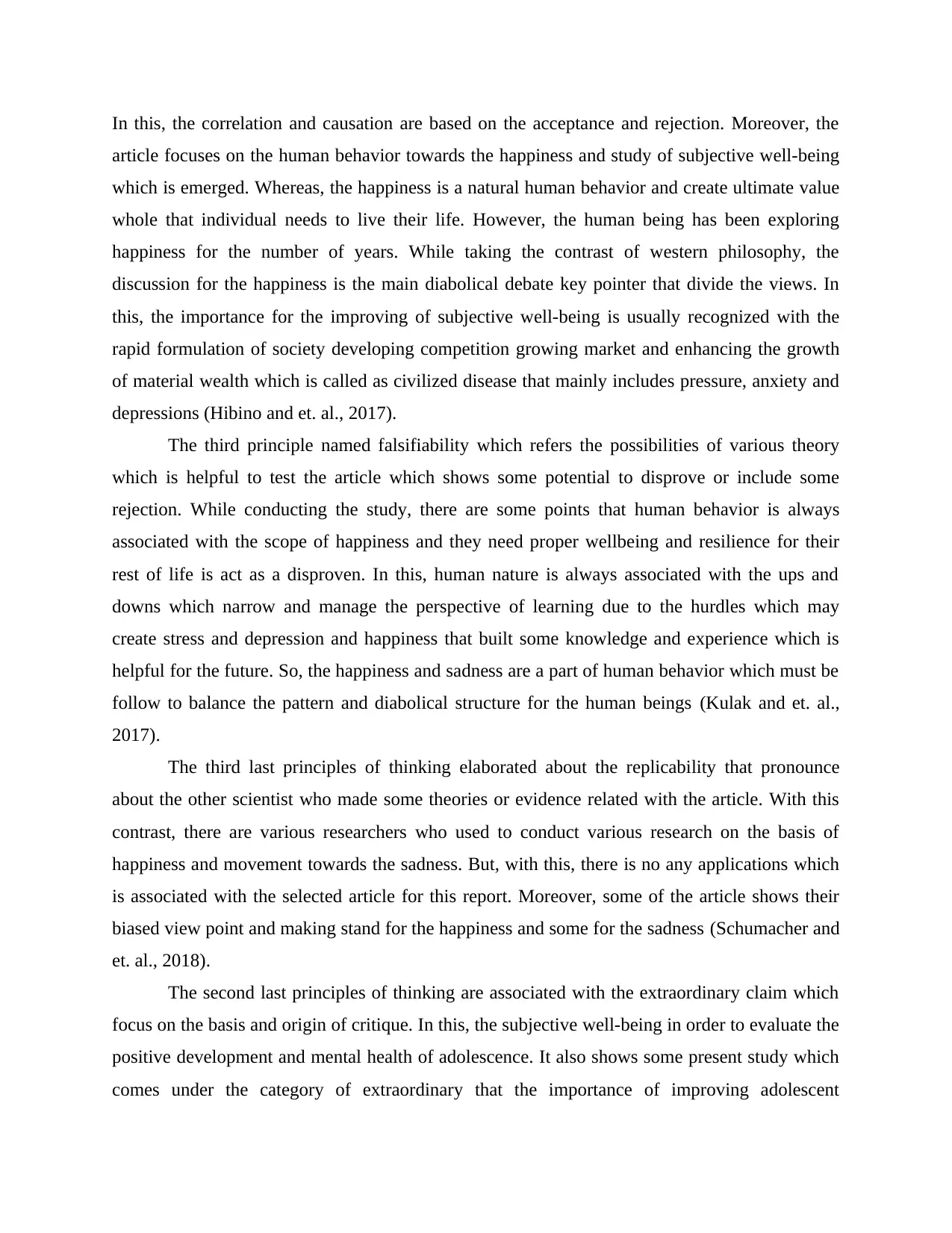
In this, the correlation and causation are based on the acceptance and rejection. Moreover, the
article focuses on the human behavior towards the happiness and study of subjective well-being
which is emerged. Whereas, the happiness is a natural human behavior and create ultimate value
whole that individual needs to live their life. However, the human being has been exploring
happiness for the number of years. While taking the contrast of western philosophy, the
discussion for the happiness is the main diabolical debate key pointer that divide the views. In
this, the importance for the improving of subjective well-being is usually recognized with the
rapid formulation of society developing competition growing market and enhancing the growth
of material wealth which is called as civilized disease that mainly includes pressure, anxiety and
depressions (Hibino and et. al., 2017).
The third principle named falsifiability which refers the possibilities of various theory
which is helpful to test the article which shows some potential to disprove or include some
rejection. While conducting the study, there are some points that human behavior is always
associated with the scope of happiness and they need proper wellbeing and resilience for their
rest of life is act as a disproven. In this, human nature is always associated with the ups and
downs which narrow and manage the perspective of learning due to the hurdles which may
create stress and depression and happiness that built some knowledge and experience which is
helpful for the future. So, the happiness and sadness are a part of human behavior which must be
follow to balance the pattern and diabolical structure for the human beings (Kulak and et. al.,
2017).
The third last principles of thinking elaborated about the replicability that pronounce
about the other scientist who made some theories or evidence related with the article. With this
contrast, there are various researchers who used to conduct various research on the basis of
happiness and movement towards the sadness. But, with this, there is no any applications which
is associated with the selected article for this report. Moreover, some of the article shows their
biased view point and making stand for the happiness and some for the sadness (Schumacher and
et. al., 2018).
The second last principles of thinking are associated with the extraordinary claim which
focus on the basis and origin of critique. In this, the subjective well-being in order to evaluate the
positive development and mental health of adolescence. It also shows some present study which
comes under the category of extraordinary that the importance of improving adolescent
article focuses on the human behavior towards the happiness and study of subjective well-being
which is emerged. Whereas, the happiness is a natural human behavior and create ultimate value
whole that individual needs to live their life. However, the human being has been exploring
happiness for the number of years. While taking the contrast of western philosophy, the
discussion for the happiness is the main diabolical debate key pointer that divide the views. In
this, the importance for the improving of subjective well-being is usually recognized with the
rapid formulation of society developing competition growing market and enhancing the growth
of material wealth which is called as civilized disease that mainly includes pressure, anxiety and
depressions (Hibino and et. al., 2017).
The third principle named falsifiability which refers the possibilities of various theory
which is helpful to test the article which shows some potential to disprove or include some
rejection. While conducting the study, there are some points that human behavior is always
associated with the scope of happiness and they need proper wellbeing and resilience for their
rest of life is act as a disproven. In this, human nature is always associated with the ups and
downs which narrow and manage the perspective of learning due to the hurdles which may
create stress and depression and happiness that built some knowledge and experience which is
helpful for the future. So, the happiness and sadness are a part of human behavior which must be
follow to balance the pattern and diabolical structure for the human beings (Kulak and et. al.,
2017).
The third last principles of thinking elaborated about the replicability that pronounce
about the other scientist who made some theories or evidence related with the article. With this
contrast, there are various researchers who used to conduct various research on the basis of
happiness and movement towards the sadness. But, with this, there is no any applications which
is associated with the selected article for this report. Moreover, some of the article shows their
biased view point and making stand for the happiness and some for the sadness (Schumacher and
et. al., 2018).
The second last principles of thinking are associated with the extraordinary claim which
focus on the basis and origin of critique. In this, the subjective well-being in order to evaluate the
positive development and mental health of adolescence. It also shows some present study which
comes under the category of extraordinary that the importance of improving adolescent
Paraphrase This Document
Need a fresh take? Get an instant paraphrase of this document with our AI Paraphraser
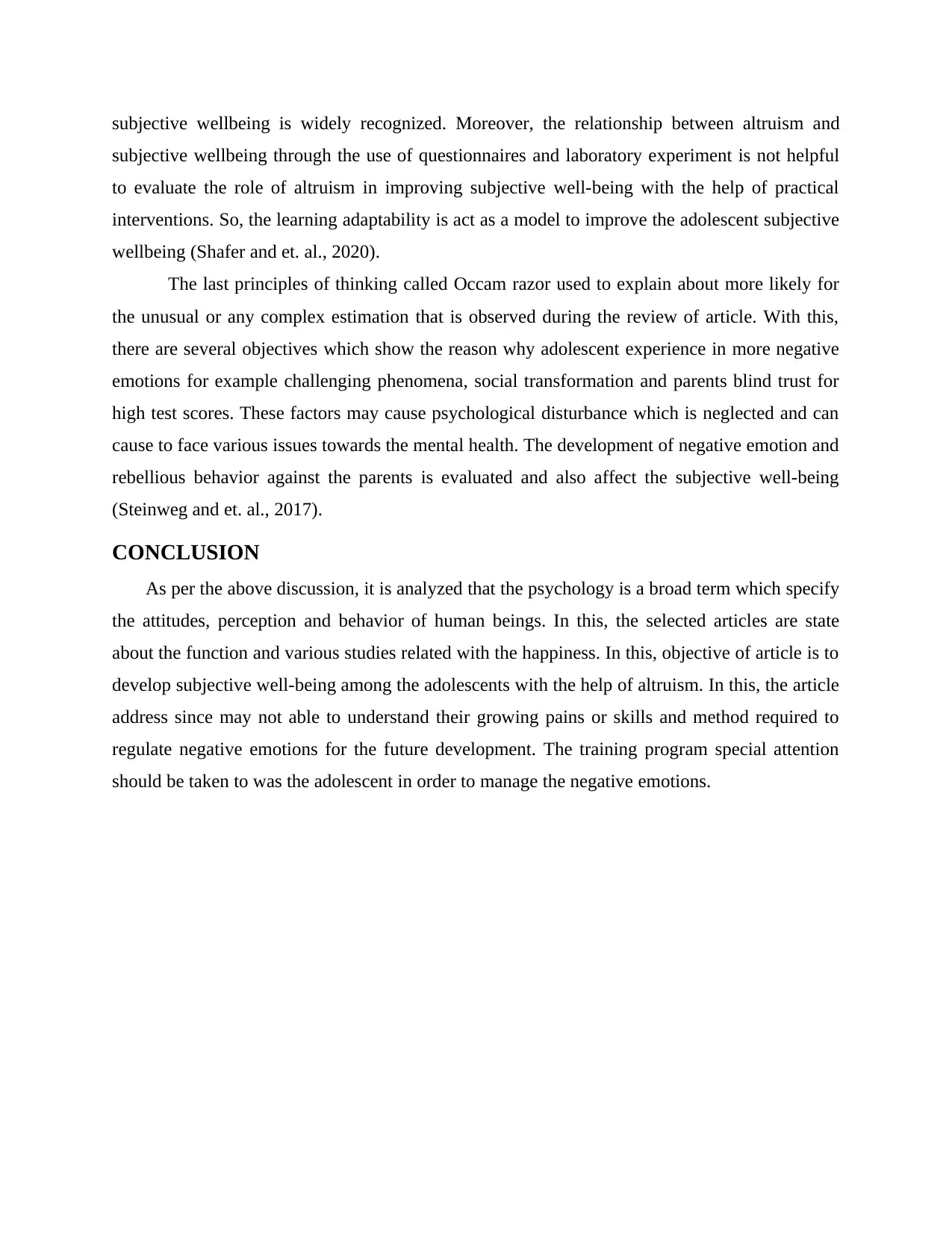
subjective wellbeing is widely recognized. Moreover, the relationship between altruism and
subjective wellbeing through the use of questionnaires and laboratory experiment is not helpful
to evaluate the role of altruism in improving subjective well-being with the help of practical
interventions. So, the learning adaptability is act as a model to improve the adolescent subjective
wellbeing (Shafer and et. al., 2020).
The last principles of thinking called Occam razor used to explain about more likely for
the unusual or any complex estimation that is observed during the review of article. With this,
there are several objectives which show the reason why adolescent experience in more negative
emotions for example challenging phenomena, social transformation and parents blind trust for
high test scores. These factors may cause psychological disturbance which is neglected and can
cause to face various issues towards the mental health. The development of negative emotion and
rebellious behavior against the parents is evaluated and also affect the subjective well-being
(Steinweg and et. al., 2017).
CONCLUSION
As per the above discussion, it is analyzed that the psychology is a broad term which specify
the attitudes, perception and behavior of human beings. In this, the selected articles are state
about the function and various studies related with the happiness. In this, objective of article is to
develop subjective well-being among the adolescents with the help of altruism. In this, the article
address since may not able to understand their growing pains or skills and method required to
regulate negative emotions for the future development. The training program special attention
should be taken to was the adolescent in order to manage the negative emotions.
subjective wellbeing through the use of questionnaires and laboratory experiment is not helpful
to evaluate the role of altruism in improving subjective well-being with the help of practical
interventions. So, the learning adaptability is act as a model to improve the adolescent subjective
wellbeing (Shafer and et. al., 2020).
The last principles of thinking called Occam razor used to explain about more likely for
the unusual or any complex estimation that is observed during the review of article. With this,
there are several objectives which show the reason why adolescent experience in more negative
emotions for example challenging phenomena, social transformation and parents blind trust for
high test scores. These factors may cause psychological disturbance which is neglected and can
cause to face various issues towards the mental health. The development of negative emotion and
rebellious behavior against the parents is evaluated and also affect the subjective well-being
(Steinweg and et. al., 2017).
CONCLUSION
As per the above discussion, it is analyzed that the psychology is a broad term which specify
the attitudes, perception and behavior of human beings. In this, the selected articles are state
about the function and various studies related with the happiness. In this, objective of article is to
develop subjective well-being among the adolescents with the help of altruism. In this, the article
address since may not able to understand their growing pains or skills and method required to
regulate negative emotions for the future development. The training program special attention
should be taken to was the adolescent in order to manage the negative emotions.
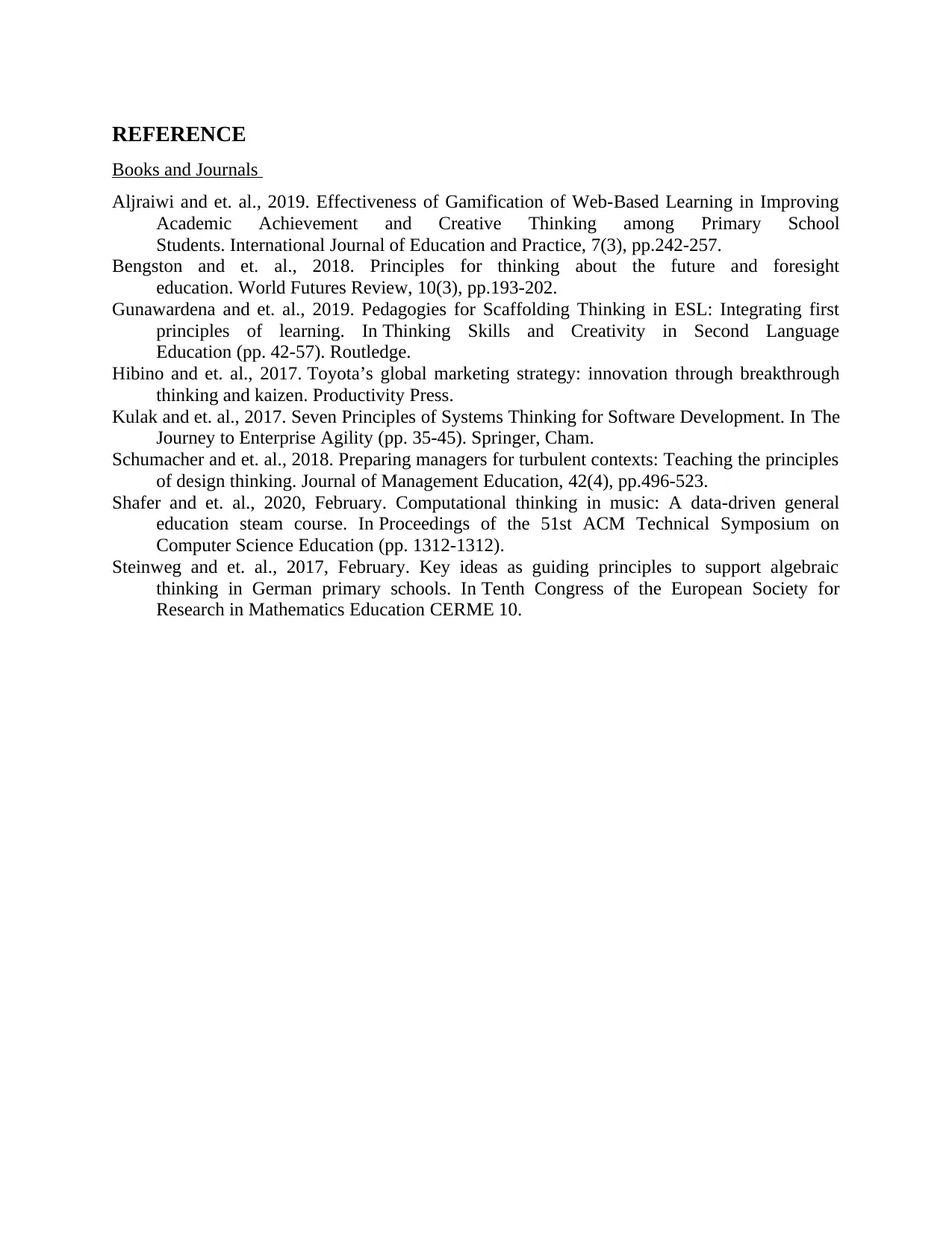
REFERENCE
Books and Journals
Aljraiwi and et. al., 2019. Effectiveness of Gamification of Web-Based Learning in Improving
Academic Achievement and Creative Thinking among Primary School
Students. International Journal of Education and Practice, 7(3), pp.242-257.
Bengston and et. al., 2018. Principles for thinking about the future and foresight
education. World Futures Review, 10(3), pp.193-202.
Gunawardena and et. al., 2019. Pedagogies for Scaffolding Thinking in ESL: Integrating first
principles of learning. In Thinking Skills and Creativity in Second Language
Education (pp. 42-57). Routledge.
Hibino and et. al., 2017. Toyota’s global marketing strategy: innovation through breakthrough
thinking and kaizen. Productivity Press.
Kulak and et. al., 2017. Seven Principles of Systems Thinking for Software Development. In The
Journey to Enterprise Agility (pp. 35-45). Springer, Cham.
Schumacher and et. al., 2018. Preparing managers for turbulent contexts: Teaching the principles
of design thinking. Journal of Management Education, 42(4), pp.496-523.
Shafer and et. al., 2020, February. Computational thinking in music: A data-driven general
education steam course. In Proceedings of the 51st ACM Technical Symposium on
Computer Science Education (pp. 1312-1312).
Steinweg and et. al., 2017, February. Key ideas as guiding principles to support algebraic
thinking in German primary schools. In Tenth Congress of the European Society for
Research in Mathematics Education CERME 10.
Books and Journals
Aljraiwi and et. al., 2019. Effectiveness of Gamification of Web-Based Learning in Improving
Academic Achievement and Creative Thinking among Primary School
Students. International Journal of Education and Practice, 7(3), pp.242-257.
Bengston and et. al., 2018. Principles for thinking about the future and foresight
education. World Futures Review, 10(3), pp.193-202.
Gunawardena and et. al., 2019. Pedagogies for Scaffolding Thinking in ESL: Integrating first
principles of learning. In Thinking Skills and Creativity in Second Language
Education (pp. 42-57). Routledge.
Hibino and et. al., 2017. Toyota’s global marketing strategy: innovation through breakthrough
thinking and kaizen. Productivity Press.
Kulak and et. al., 2017. Seven Principles of Systems Thinking for Software Development. In The
Journey to Enterprise Agility (pp. 35-45). Springer, Cham.
Schumacher and et. al., 2018. Preparing managers for turbulent contexts: Teaching the principles
of design thinking. Journal of Management Education, 42(4), pp.496-523.
Shafer and et. al., 2020, February. Computational thinking in music: A data-driven general
education steam course. In Proceedings of the 51st ACM Technical Symposium on
Computer Science Education (pp. 1312-1312).
Steinweg and et. al., 2017, February. Key ideas as guiding principles to support algebraic
thinking in German primary schools. In Tenth Congress of the European Society for
Research in Mathematics Education CERME 10.
⊘ This is a preview!⊘
Do you want full access?
Subscribe today to unlock all pages.

Trusted by 1+ million students worldwide
1 out of 6
Related Documents
Your All-in-One AI-Powered Toolkit for Academic Success.
+13062052269
info@desklib.com
Available 24*7 on WhatsApp / Email
![[object Object]](/_next/static/media/star-bottom.7253800d.svg)
Unlock your academic potential
Copyright © 2020–2025 A2Z Services. All Rights Reserved. Developed and managed by ZUCOL.




